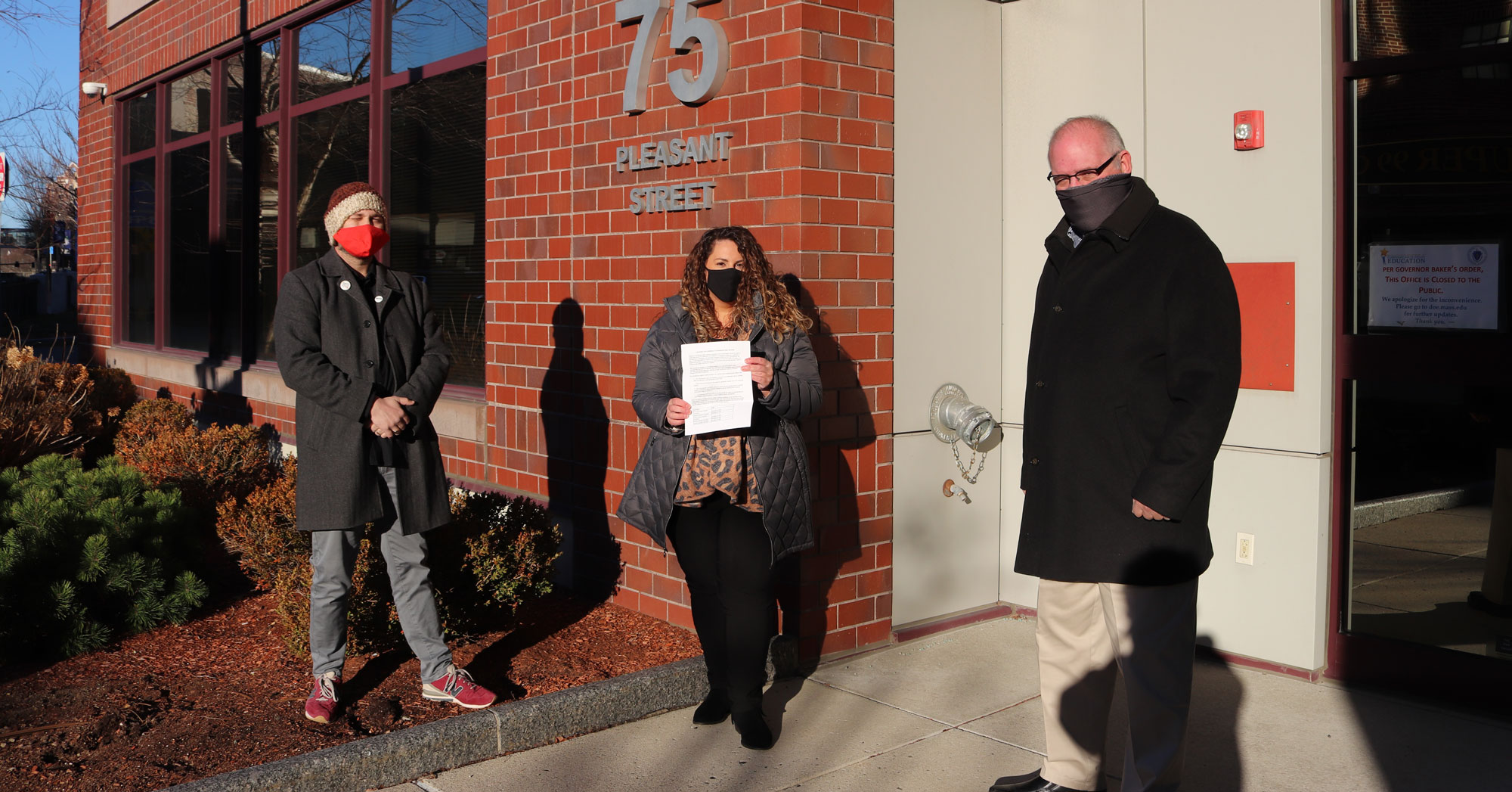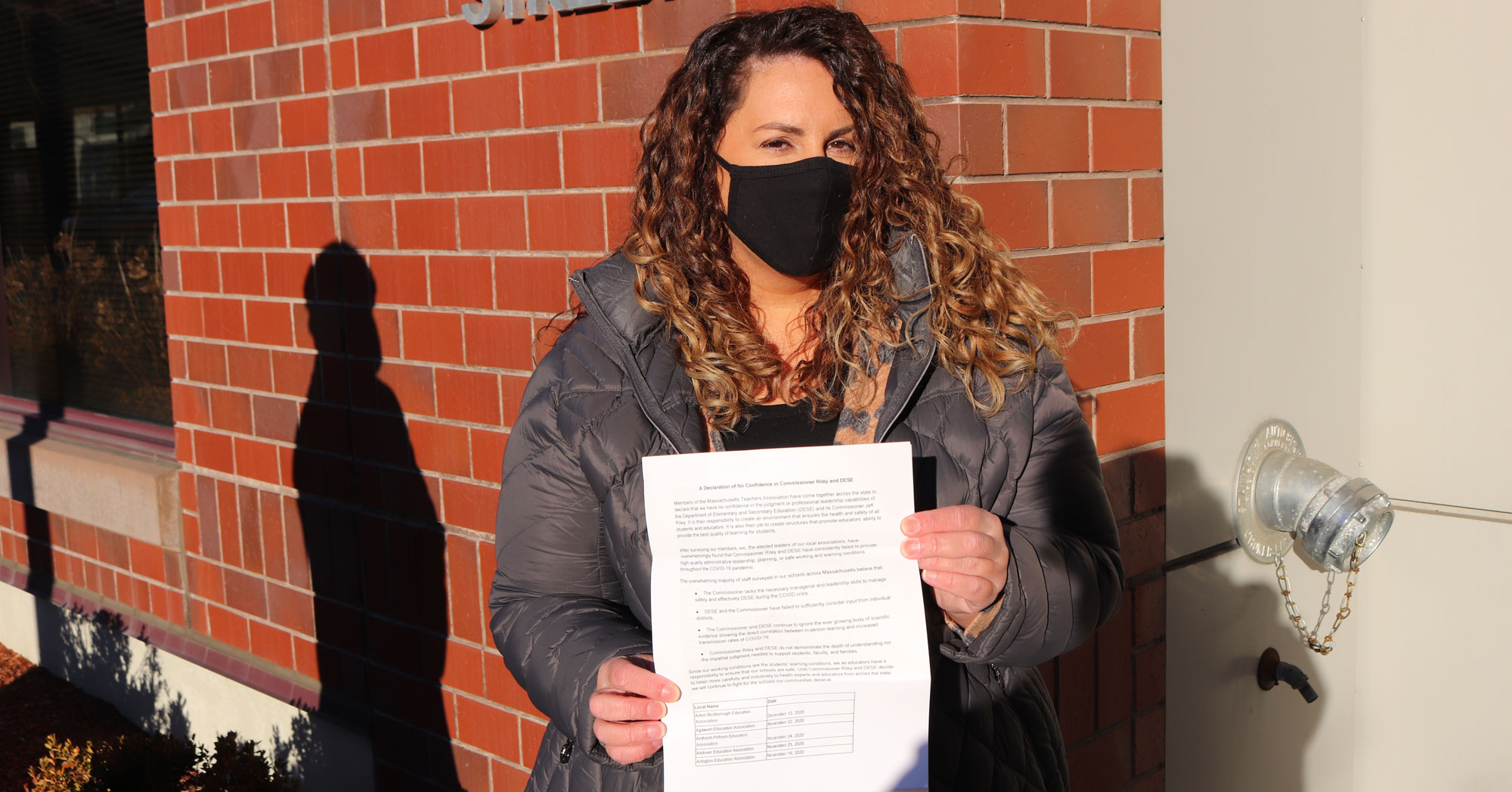More than 100 local educators’ unions vote ‘no confidence’ in Riley
More than 100 local educators’ unions vote ‘no confidence’ in Riley

More than 100 local educators’ unions have voted “no confidence” in Education Commissioner Jeffrey Riley’s performance during the coronavirus pandemic, citing concerns about his lack of leadership, failure to heed data on in-school transmission of COVID-19, and failure to demonstrate “the impartial judgment needed to support students, faculty and families.”
Download the petition and signers
Three non-union education groups joined 104 educators’ unions in voting to support the no-confidence petition between Nov. 14 and Dec. 14. Three of the local union presidents testified before the Board of Elementary and Secondary Education today to make the case for changes needed to support educators and improve health and safety in our schools.
The locals are affiliated with the Massachusetts Teachers Association and represent nearly half of the MTA’s preK-12 members. The speakers said the no-confidence petition was a grassroots action initiated by local affiliates. It was not led or directed by the MTA, though the MTA supports their efforts.
“We worked with local health officials and elected leaders for months to develop an education plan that met DESE guidelines and addressed conditions in our community, only to have the rug pulled out from under us when the commissioner changed the metrics and reopening guidance.”
Haverhill Education Association President Anthony Parolisi
Anthony Parolisi, president of the Haverhill Education Association, testified that one of the major concerns has been the commissioner’s failure to consult with educators or their unions before announcing changes in policies — changes that are disruptive and that amount to “moving the goal posts.”
A major change was the abrupt announcement on Nov. 6 that the state’s transmission risk metrics were being altered to dramatically reduce the number of communities identified as “high risk,” even as the number of cases was skyrocketing.
“We worked with local health officials and elected leaders for months to develop an education plan that met DESE guidelines and addressed conditions in our community, only to have the rug pulled out from under us when the commissioner changed the metrics and reopening guidance,” Parolisi said.
Another example, he said, was the board’s plan to vote on new “emergency” regulations altering requirements for synchronous learning without discussing the proposal with the educators who would be directly impacted. “We are trying to hold this fragile and difficult system of remote and hybrid learning together for the benefit of our students,” Parolisi said. “It is extremely disruptive when the commissioner changes the rules without even talking to us about what is working, what isn’t, and what support we need from the state to succeed.”
Deb Gesualdo, president of the Malden Education Association, voiced similar concerns and said the commissioner has failed to address the needs of educators and students in two other ways: implementing COVID-19 surveillance testing in every school and canceling MCAS testing this spring.

“There are a few wealthy districts, including Wellesley, that have implemented frequent surveillance testing so they can identify asymptomatic carriers of COVID-19 and limit transmission in schools,” Gesualdo said. “This program should be available across the state regardless of family income, paid for with tax dollars. Why hasn’t the commissioner advocated for the resources to do this?”
“I doubt you will find one educator in 100 who believes that administering the MCAS this year is a good use of our precious time with students. Most school committees agree with us and so do the majority of the parents we talk to.”
Malden Education Association President Deborah Gesualdo
Gesualdo said that some of the funding could come from canceling a very different test — the MCAS, which Riley has said students will have to take even though testing students in the middle of a pandemic will take time away from educating and supporting them.
“I doubt you will find one educator in 100 who believes that administering the MCAS this year is a good use of our precious time with students,” she said. “Most school committees agree with us and so do the majority of the parents we talk to."
She added that administering the ACCESS test for English learners is also misguided since students would have to be tested inside school buildings even in districts that are fully remote because of safety concerns.
“We are saying ‘yes’ to COVID testing and ‘no’ to MCAS and ACCESS testing this year,” Gesualdo said.
The third speaker was Roger Nugent, president of the Educational Association of Worcester.
“Many schools in our district are old and do not have adequate ventilation,” Nugent said. “The district is purchasing technology to improve air quality, but until that happens it isn’t safe to put large numbers of students and staff together in these buildings.”
Rather than provide resources and guidance on how to make buildings safer, Nugent said, the commissioner has tried to pressure Worcester and other districts to open for more in-person learning.
“We all know that teaching and learning work best in person,” said Nugent, “but we can’t sacrifice the health and safety of both students and staff by opening in unsafe conditions. Worcester County has had more than 32,000 cases and more than 1,300 deaths from COVID-19. We can’t afford to let down our guard.”
Gesualdo concluded, “Major changes are needed to restore our confidence in the commissioner and in this board. Please hear our concerns. Do not sweep them under the rug.”
“The district is purchasing technology to improve air quality, but until that happens it isn’t safe to put large numbers of students and staff together in these buildings.”
Educational Association of Worcester President Roger Nugent























